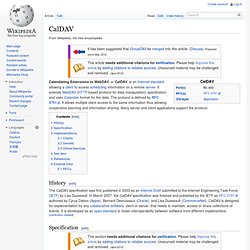

Afs. FUSEWiki - FileSystems. DAV Frequently Asked Questions. While the IETF expects that all participants are individual contributors, a lot can be learned by looking at the corporate affiliations of key participants.

After all, if they're able to spend significant time developing DAV, they probably have the full support of their organization. Participants from Microsoft, Netscape, Novell, and Xerox spent significant time developing the base DAV protocol, and there was significant interest by participants from document management vendors such as Filenet, Documentum and PC Docs as well. Jim Whitehead from U.C. Irvine chaired the effort, which is significant when you realize his officemate is Roy Fielding, a founder of the Apache Group. Combined, these organizations have the ability to make DAV a de-facto standard, with combined controlling marketshare on both the client and server side.
A team with world-class versioning and CM expertise is working to develop the versioning standard. WebDAV Resources. Do it Yourself .mac. Projects. CalDAV. History[edit] The CalDAV specification was first published in 2003 as an Internet Draft submitted to the Internet Engineering Task Force (IETF) by Lisa Dusseault.

In March 2007, the CalDAV specification was finished and published by the IETF as RFC 4791, authored by Cyrus Daboo (Apple), Bernard Desruissaux (Oracle), and Lisa Dusseault (CommerceNet). CalDAV is designed for implementation by any collaborative software, client or server, that needs to maintain, access or share collections of events. It is developed as an open standard to foster interoperability between software from different implementers. [clarification needed] Specification[edit] The architecture of CalDAV (partially inherited from the underlying specifications) organizes the data (events, tasks, free-busy info, notes) in directories (collections), where multiple items (resources) reside.
For access control the concept of ACLs are used, so each operation (view, edit, delete etc.) can be denied or granted per user. Publish iCal calendars with local WebDAV server. Greg Westin: Enabling WebDAV on OS X for use with iCal. Goliath: A website management application for MacOS. A minor bug fix release - Goliath 1.0.1 is now available. 2 bug fixes are included in this release: Files with a / in their name are now handled properly.

A crash while trying to view the contents of folders that the current user does not have permissions to access. Also, Japanese localized versions of Goliath are available. Check it out at Description Goliath is an application that creates and edits websites. With Goliath, users can: Planned features for future versions of Goliath include: Copy, and Move files and folders within a web site DAV Searching (DASL) AppleEvents scriptable Future DAV initiatives (like DeltaV and ACL Support) Goliath has been tested with a number of WebDAV servers. Please report any compatibility problems with other DAV server implementations. System Requirements The Classic MacOS application requires a PowerPC based Macintosh running MacOS 8.1 or higher.
Downloads Classic MacOS Mac OS X DiskCopy archive for Mac OS X is available here. Source Code Older downloads License. Help on Goliath. WebDave Applications. Many current products, like Adobe GoLive, Macromedia Dreamweaver, Microsoft Web Folders and Microsoft Office 2000, now support the use of WebDAV (Web Distributed Authoring and Versioning) to access and save content directly to servers that support the WebDAV protocol.

If your license includes the WebDAV add-on module, WebSite Director (WSD) provides you with the ability to to manage your web content using applications that support this protocol/interface. The WSD WebDAV module must be installed on an Apache web server. If your site does NOT use an Apache web server, you must install one for use by the WebDAV module. In that case, you must set it to listen on some port other than the one used by the server providing access to your web site (i.e. port 8080). All URLs used to access the WebDAV module when your Apache server is NOT listening on the default port (80) must include the Apache listening port number (i.e.
" The following instructions will Note this where applicable.